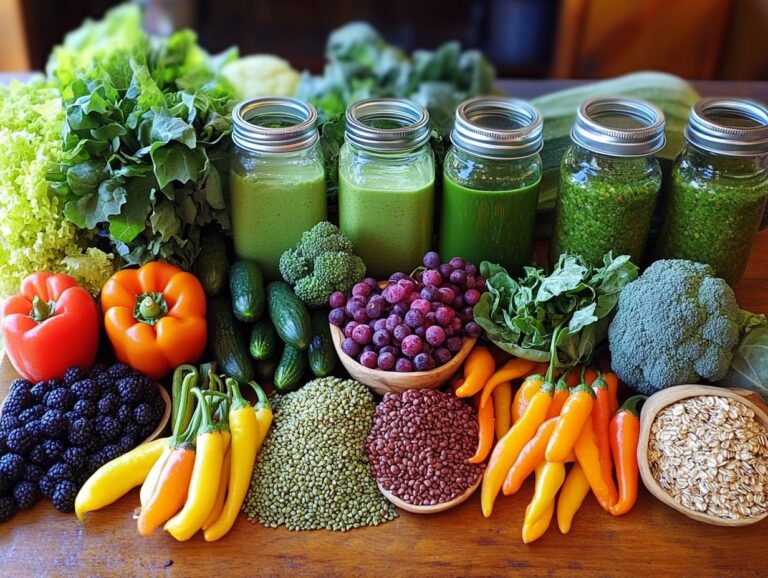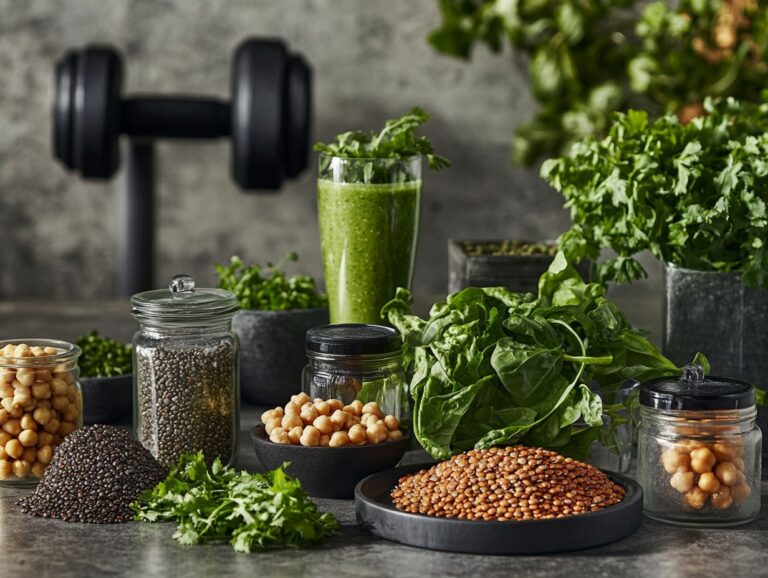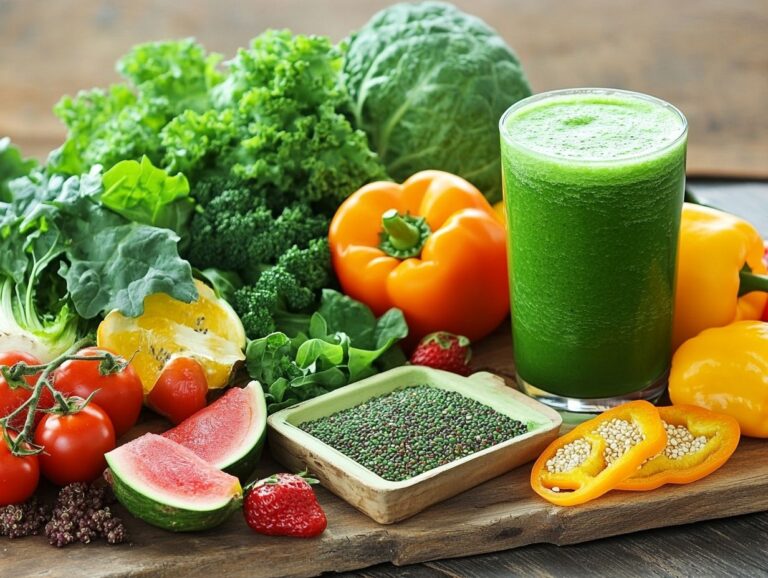This article examines the connection between a vegan diet and skin health, highlighting how plant-based eating can enhance complexion by reducing inflammation, increasing antioxidant levels, and improving gut health. It discusses how nutrient-rich foods like blueberries and acerola cherries can contribute to glowing skin. It provides a comprehensive list of the best foods to consume for healthy skin, along with the essential nutrients required for optimal skin health and skincare tips specifically for vegans. Additionally, the article outlines some common mistakes to avoid while following this diet and discusses how it can be effective in treating skin conditions such as acne and eczema.
What Is a Vegan Diet?
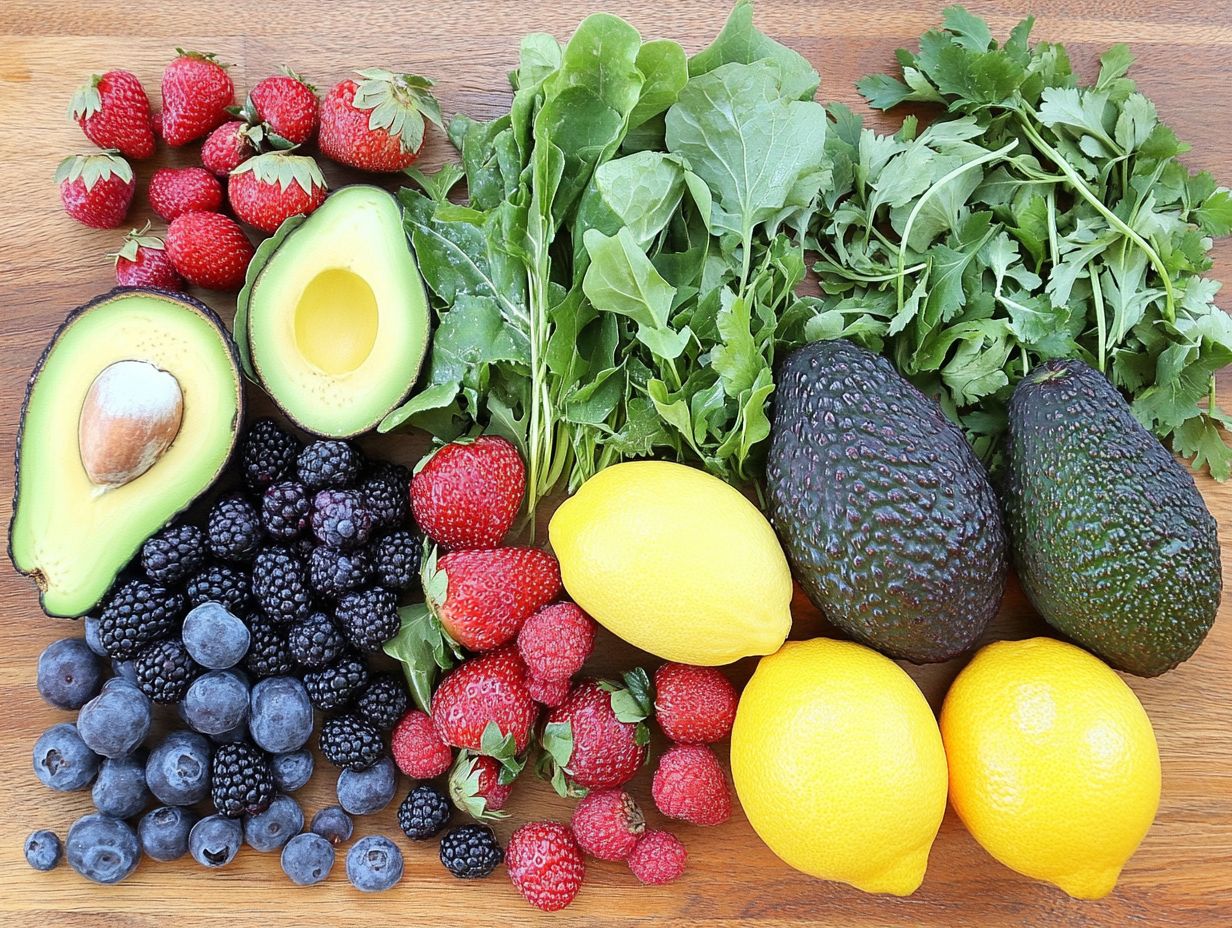
A vegan diet is a lifestyle choice in which individuals refrain from consuming or using any products derived from animals. Vegans exclusively eat plant-based foods, including fruits, vegetables, grains, nuts, and seeds.
This dietary approach aims to provide health benefits while also minimizing negative impacts on the environment. Plus promoting the positive health effects of nutrient-dense foods that support overall well-being, vegan diets emphasize ethical and sustainable living by reducing reliance on animal agriculture practices.
How Does a Vegan Diet Affect Skin Health?
A vegan diet is known for its anti-aging properties and its ability to improve skin appearance through the intake of superfood powder and dietary fiber.
The vegan diet significantly impacts skin health by offering a rich array of antioxidants, healthy fats, and vitamins that contribute to a glowing complexion.
By prioritizing plant-based foods such as berries, green tea, and avocados, as well as incorporating foods like dark chocolate, individuals can promote skin vitality and enhance their overall beauty from within.
This dietary approach plays a crucial role in improving skin regeneration and combating various skin conditions.
1. Reduces Inflammation
Plant-based foods like chia seeds and olive oil are effective in reducing inflammation.
A vegan diet rich in plant-based foods is well-known for its anti-inflammatory effects, which significantly reduce skin inflammation and contribute to healthier skin. This is essential for maintaining optimal skin health and managing various skin conditions.
The inclusion of specific components, such as dietary fiber and antioxidants, plays a crucial role in achieving these benefits. Foods high in antioxidants, such as turmeric, which contains curcumin, and tomatoes, which contain lycopene, provide substantial antioxidant activity that helps counteract oxidative stress—an important contributor to skin problems.
Additionally, high-fiber plant foods like legumes, whole grains, and chia seeds promote gut health, which is increasingly linked to skin disorders such as acne and eczema.
A balanced intake of these nutrients can enhance skin quality and reduce the likelihood of flare-ups, thereby bringing the goal of healthy skin within reach.
2. Increases Antioxidants
Plant-based foods such as turmeric and bell peppers are rich in antioxidants.
Incorporating a variety of plant foods into a vegan diet boosts antioxidant intake, which plays a crucial role in combating oxidative stress and protecting the skin from damage. This support for skin health can also aid in treating various skin conditions.
Foods such as berries, dark chocolate, and bell peppers are particularly high in antioxidants and vitamin C, both of which are essential for collagen formation—important for maintaining skin elasticity and firmness. Antioxidants help neutralize free radicals that contribute to premature aging, allowing the skin to retain its youthful appearance.
Additionally, consuming a diverse range of antioxidant-rich foods, such as kale, spinach, and sweet potatoes, can enhance the overall appearance and resilience of the skin. Including these foods in your diet not only helps counteract the aging process but also reduces inflammation, leading to clearer and more radiant skin.
In conclusion, dietary choices significantly influence skin health and appearance.
3. Improves Gut Health
A vegan diet is an effective way to improve gut health, which is essential for skin regeneration. A healthy gut microbiome can enhance skin quality and reduce issues such as acne and eczema.
A diet rich in dietary fiber from fruits, vegetables, and whole grains promotes digestive health and aids in nutrient absorption. The connection between gut health and skin regeneration is significant because a balanced microbiome supports the body’s detoxification processes and reduces inflammation, both of which are crucial for achieving clear, healthy skin.
For instance, consuming high-fiber foods like beans, lentils, oats, and various fruits, such as apples and berries, not only benefits gut health but also improves skin conditions. These foods serve as prebiotics, nourishing beneficial bacteria in the gut, which can lead to healthier, stronger skin over time.
Individuals following this lifestyle can expect to see a noticeable reduction in breakouts and dryness as time progresses.
What Are the Best Foods for Healthy Skin on a Vegan Diet?
A vegan diet can promote healthy skin when it incorporates a diverse range of nutrient-rich foods known to enhance skin health, resulting in a natural glow through essential vitamins and healthy fats.
Fundamental foods such as fruits, vegetables, nuts, and seeds supply the key nutrients necessary to maintain healthy skin.
1. Fruits and Vegetables
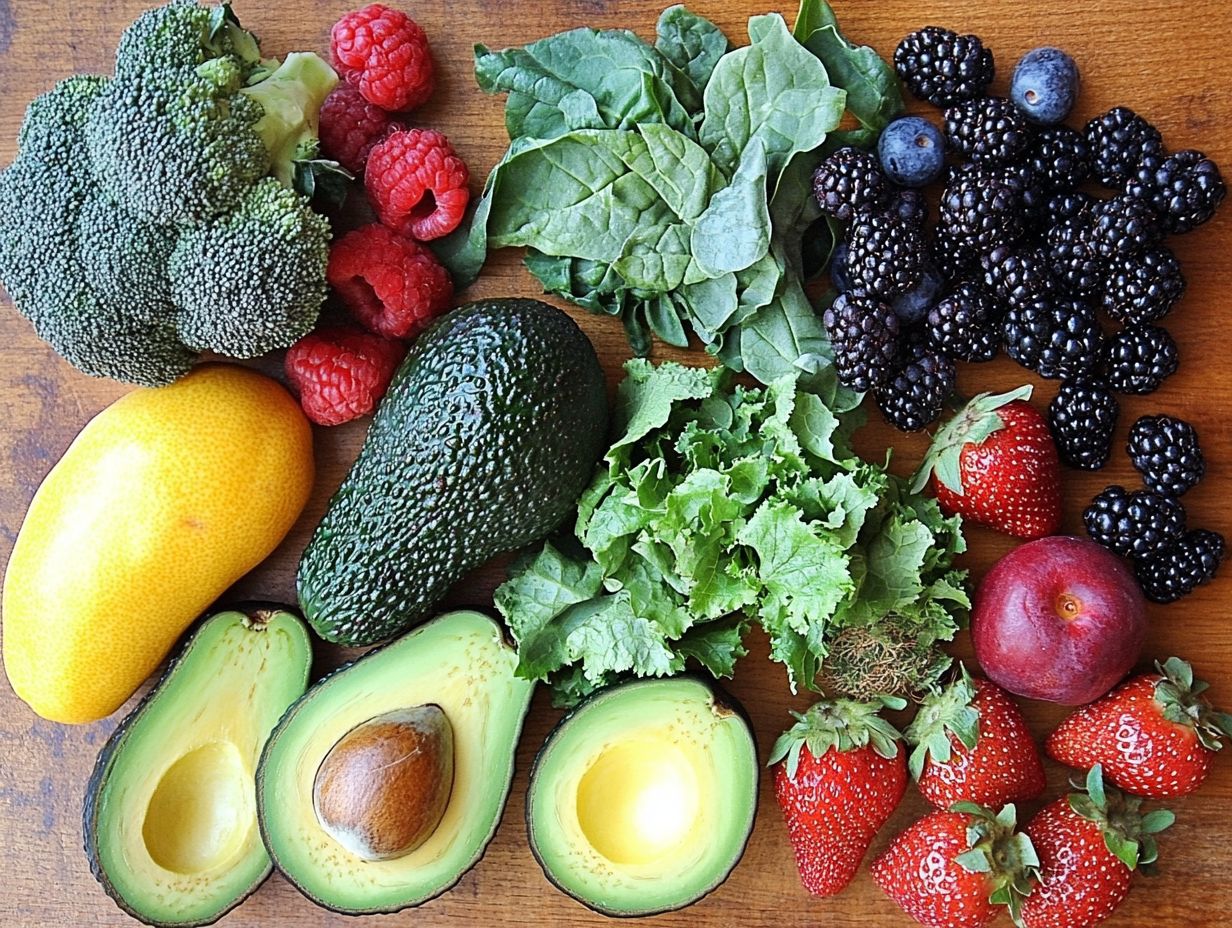
Fruits and vegetables like sweet potatoes and garlic are fundamental components of a vegan diet, providing essential vitamins, including vitamin C, which is crucial for collagen synthesis and skin tissue regeneration.
Fruits and vegetables are fundamental components of a vegan diet, providing essential vitamins, including vitamin C, which is crucial for collagen synthesis and skin tissue regeneration.
Foods like acerola cherries, sweet potatoes, and garlic possess strong antioxidant properties that enhance overall skin health. Increasing the consumption of these colorful plant foods positively impacts skin health.
For instance, carrots are rich in beta-carotene, which the body converts into vitamin A, promoting cellular turnover and helping to create younger-looking skin. Leafy greens, such as spinach and kale, are abundant in vitamins E and K, offering protective qualities that reduce inflammation and dark circles.
Additionally, avocados are high in healthy fats and vitamin E, which deeply nourish the skin and improve moisture retention, resulting in a plumper and more radiant appearance.
2. Nuts and Seeds
Nuts and seeds, such as pumpkin seeds and walnuts, are excellent sources of fatty acids and vitamin E, both of which are essential for maintaining hydrated and elastic skin, contributing to a more youthful appearance.
Nuts and seeds are excellent sources of fatty acids and vitamin E, both of which are essential for maintaining hydrated and elastic skin, contributing to a more youthful appearance. Walnuts and pumpkin seeds provide these nutrients along with the necessary fatty acids that nourish the skin from the inside out.
Vegan diets that incorporate these foods can offer significant benefits for skin health. Walnuts, in particular, are one of the best sources of omega-3 fatty acids, which help reduce inflammation and promote a plump, dewy complexion.
Additionally, ingredients rich in zinc and magnesium, such as pumpkin seeds, are vital for skin healing and combating acne. By including a variety of nuts and seeds in their daily meals, individuals can ensure they are receiving ample antioxidants and other important nutrients to support hydration and elasticity.
This not only aids in achieving a glowing complexion but also enhances the skin’s overall thickness and resilience against environmental stressors.
3. Whole Grains
Whole grains in a vegan diet significantly benefit skin health by providing dietary fiber, which aids digestion and can help treat various skin conditions. Nutritious options include grains like quinoa and oats.
Whole grains in a vegan diet significantly benefit skin health by providing dietary fiber, which aids digestion and can help treat various skin conditions. Nutritious options like brown rice, quinoa, and oats help maintain stable blood sugar levels, positively influencing skin appearance.
These grains are rich in essential nutrients, including vitamins and minerals, that are crucial for overall well-being. For instance, quinoa is a complete protein, containing all nine essential amino acids necessary for tissue repair and regeneration, which directly impacts skin health.
Oats possess soothing properties that can alleviate symptoms of eczema and psoriasis. Additionally, grains high in magnesium, such as barley, promote moisture retention in the skin and help reduce dryness.
Incorporating a variety of whole grains into your daily diet can yield numerous benefits that extend beyond the dinner table, enhancing both complexion and overall health.
What Nutrients Are Essential for Healthy Skin on a Vegan Diet?
A vegan diet includes several skin-friendly nutrients, such as vitamin C, vitamin E, and omega-3 fatty acids, which are essential for maintaining cellular health and promoting skin regeneration.
These nutrients, found in a variety of plant-based foods like spirulina, collectively contribute to the overall health and appearance of the skin.
1. Vitamin C
Vitamin C is a powerful antioxidant that plays a crucial role in collagen synthesis and skin renewal. It protects the skin from oxidative stress, helping to maintain healthy skin cells and elasticity.
Consuming vitamin C-rich foods, such as berries and bell peppers, can combat oxidative stress and enhance skin elasticity. Plus shielding the skin from external environmental factors that cause damage, vitamin C can also reduce the appearance of fine lines and wrinkles, restoring a youthful radiance to the skin.
Plant-based sources of vitamin C include acerola cherry and other foods:
- citrus fruits like oranges, lemons, and limes
- berries
- bell peppers
- leafy green vegetables
- broccoli
For those following a vegan diet, obtaining vitamin C can be both easy and enjoyable. It can be effortlessly incorporated into meals through options such as fresh spinach in a smoothie, slices of bell pepper in a salad, or citrus in a quinoa bowl.
By including these foods in your diet and exploring various recipes, you can support both skin health and overall nutrition.
2. Vitamin E
Vitamin E is an essential nutrient for maintaining skin health, thanks to its antioxidant properties that protect the skin from free radicals.
Foods rich in vitamin E, such as olive oil, chia seeds, and avocados, contribute to skin hydration and enhance overall complexion. Consuming vitamin E can help improve skin vitality and resilience, as it plays a crucial role in maintaining skin elasticity, reducing inflammation, and the appearance of scars.
Vegan sources of vitamin E, including spinach, almonds, and sweet potatoes, can be easily incorporated into various diets. For instance, a healthy salad made with spinach, a handful of almond slices, or a delicious sweet potato mash can serve as a nutrient-rich meal to promote skin health.
Additionally, chia seeds can be effortlessly added to smoothies or oatmeal, providing a nutritious breakfast option that promotes skin health and contributes to glowing skin.
3. Omega-3 Fatty Acids
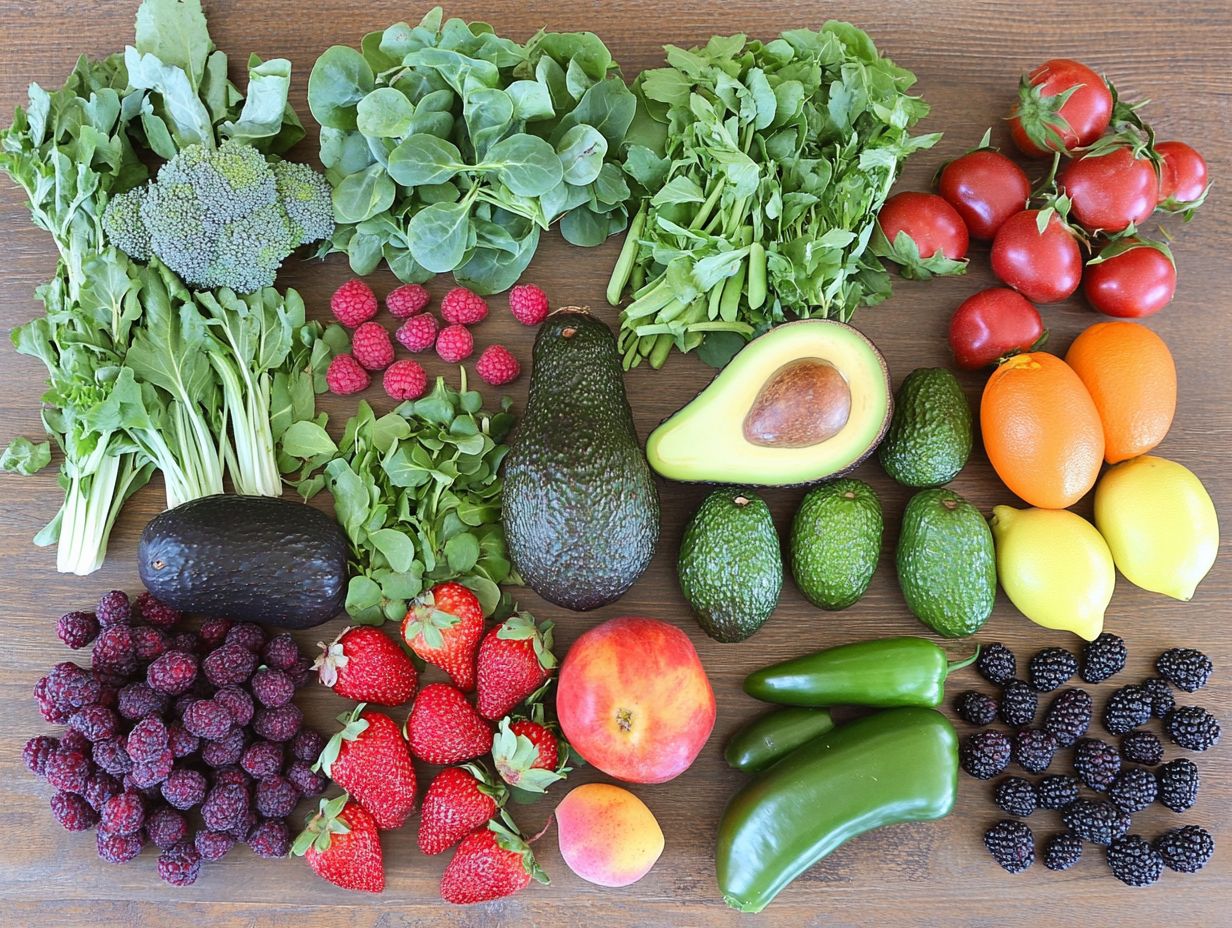
Omega-3 fatty acids play a vital role in supporting skin health by helping to maintain the skin barrier and keeping it well-hydrated, thereby reducing dryness and irritation, and promoting overall skin appearance.
Plant-based sources of omega-3 fatty acids, such as chia seeds and walnuts, are essential components of a healthy vegan diet. These sources contribute significantly to moisture retention, which is important for achieving a youthful appearance and enhancing skin resilience.
Omega-3 fatty acids also possess anti-inflammatory properties that can alleviate symptoms of eczema and acne while enhancing the overall resilience of the skin. Additionally, these fatty acids support collagen synthesis, which is vital for maintaining healthy skin.
Easy-to-incorporate vegan sources of omega-3s include:
- Ground flaxseeds, which can be added to smoothies or oatmeal
- A small handful of walnuts for a nutritious snack
- Pumpkin seeds for an extra boost of healthy fats
Additionally, incorporating sources of omega-3s, such as adding hemp seed oil to salad dressings or blending chia seeds into smoothie puddings, ensures that obtaining these essential fatty acids is both simple and enjoyable. Including superfood powder containing spirulina in your diet can also provide an additional nutrient boost.
What Are Some Vegan Skincare Tips?
Vegan skincare tips encompass the use of plant-based cleansers and moisturizers, along with natural ingredients that promote skin health, hydration, and beauty from within.
By following these guidelines, you can enhance your skin’s vitality and beauty while staying true to vegan principles.
1. Use Plant-based Cleansers and Moisturizers
Incorporating plant-based cleansers and moisturizers is a fundamental aspect of vegan skincare, ensuring that products are not only cruelty-free but also beneficial for skin health and protecting against environmental harm.
Ingredients such as aloe vera and coconut oil are excellent choices for nourishing and hydrating the skin. These natural components effectively soothe irritation and maintain the skin’s moisture barrier without the harsh chemicals often found in conventional products. Including dietary fiber from vegetables like sweet potatoes can further support skin health by promoting detoxification.
For instance, cleansers infused with chamomile extract gently remove impurities while calming redness, making them ideal for sensitive skin types. Meanwhile, moisturizers enriched with hyaluronic acid derived from plant sources offer long-lasting hydration, locking in moisture and promoting a plump, youthful appearance. Including dark chocolate in your diet can also support skin hydration and elasticity.
By choosing these plant-based alternatives, users can enhance their skin texture and overall health while embracing a more sustainable and ethical approach to skincare.
2. Exfoliate with Natural Ingredients
Exfoliating with natural ingredients is vital for skin regeneration, as it helps remove dead skin cells and promotes a fresh complexion. Natural exfoliants like turmeric and sugar offer similar benefits to commercially available products while minimizing exposure to harsh chemicals. Adding vitamin C from bell peppers to your diet can enhance skin brightness and clarity.
Incorporating these natural alternatives into a skincare routine can significantly enhance skin texture and improve overall radiance. For example, a simple sugar scrub can be made by mixing brown sugar with olive oil, creating a nourishing blend that hydrates the skin while effectively buffing away impurities. Drinking green tea can also provide antioxidants that support skin health.
Additionally, a turmeric and yogurt mask not only exfoliates but also provides anti-inflammatory benefits, making it an excellent choice for calming irritation or redness. Including tomatoes in your diet can further support skin health by providing lycopene, which protects against UV damage.
3. Stay Hydrated with Water and Herbal Teas
Staying hydrated is crucial for maintaining healthy skin. Drinking sufficient amounts of water, herbal teas, and consuming nutrient-rich foods not only hydrates the skin but also promotes overall well-being.
Herbal teas, especially those rich in antioxidants, offer additional benefits that can enhance the skin’s appearance. The skin acts as a protective barrier, and when it is well-hydrated, it can better defend against environmental stressors, leading to improved skin appearance. Including berries in your diet can also provide antioxidants that support skin health.
Dehydration can result in dry, flaky skin and make fine lines more noticeable, which is why it is important to consume enough water—ideally, eight glasses a day.
Herbal teas such as chamomile, known for its calming effects, and green tea, rich in polyphenols, can further enhance hydration levels. Rooibos tea, recognized for its anti-inflammatory properties, can help reduce redness and promote an even skin tone. Incorporating acerola cherry in your diet can boost collagen production due to its high vitamin C content.
Incorporating these beverages into one’s daily routine can be beneficial for skin health.
What Are Some Common Vegan Diet Mistakes That Can Affect Skin Health?
Common mistakes in a vegan diet can negatively impact skin health and often arise from inadequate nutrient intake, excessive consumption of processed foods, and insufficient hydration. Ensuring a dietary intake of nutrient-rich foods can help mitigate these issues.
Individuals following a vegan lifestyle should ensure they maintain a well-balanced diet that includes a diverse array of nutrient-dense foods to effectively support skin health. Incorporating superfood powders like spirulina can provide additional nutrients beneficial for the skin.
1. Not Getting Enough Nutrients
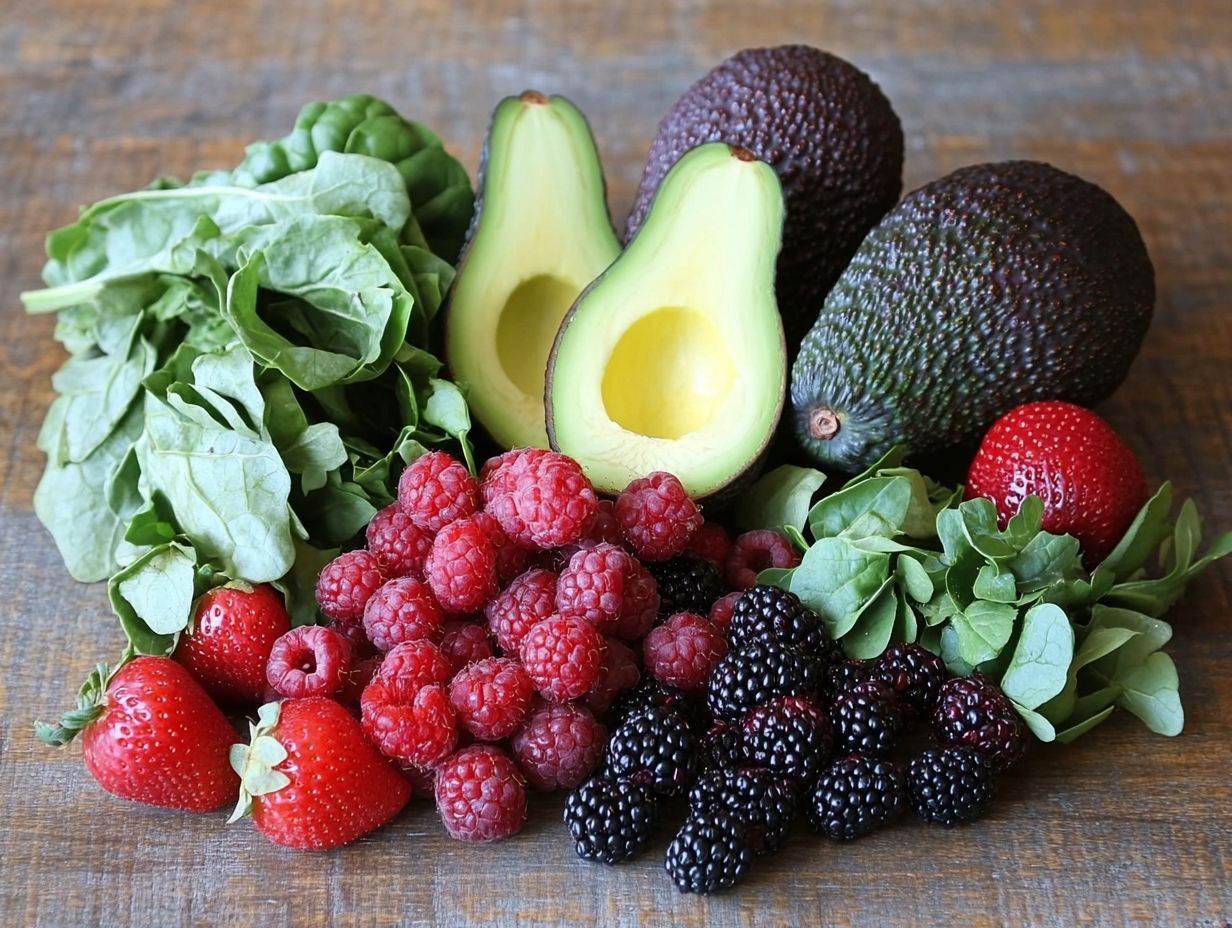
A lack of essential nutrients can lead to deficiencies that negatively affect skin health. Vitamin B12 and iron are crucial for maintaining healthy skin tones, and those following vegan diets must supplement their intake of these nutrients to avoid potential adverse effects.
However, vitamin B12 and iron are not the only important nutrients for skin health. Other key nutrients, such as omega-3 fatty acids and vitamin E, also play significant roles in maintaining healthy skin. Including garlic and blueberries in your diet can further enhance skin health due to their antioxidant properties.
Omega-3 fatty acids are essential for skin hydration and controlling inflammation, while vitamin E is necessary for skin repair, regeneration, and protection against oxidative stress.
Plant-based sources of omega-3 include:
- Flaxseeds
- Walnuts
- Chia seeds
While healthy plant-based sources of vitamin E include:
- Nuts
- Seeds
- Avocados
Individuals can obtain these nutrients in adequate amounts by incorporating a wide variety of whole foods and/or using fortified products and supplements.
2. Relying Too Much on Processed Foods
A diet high in processed foods can negatively impact skin health due to their low nutritional value and high levels of additives, leading to issues such as breakouts and dullness. In contrast, a diet rich in whole, nutrient-dense foods is essential for optimal skin appearance. Consuming whole foods can significantly enhance skin vitality, as a diverse array of fruits, vegetables, nuts, and seeds provides an abundance of vitamins, minerals, hydration, and promotes skin elasticity and collagen synthesis.
Vegan foods that are beneficial for skin health include items high in antioxidants, such as:
- Berries
- Vitamin C-rich foods like citrus fruits and peppers
- Nutrient-dense leafy greens
Antioxidants, including vitamins A, C, and E, as well as selenium, help protect the skin from oxidative stress and inflammation, which can lead to premature aging. Additionally, healthy fats found in avocados and olive oil support the skin’s moisture barrier, helping to prevent dryness. Including superfood powders like spirulina can also provide a rich source of antioxidants and nutrients.
A diet abundant in whole plant foods supplies the essential building blocks necessary for the body’s natural collagen production, which is vital for maintaining skin firmness and elasticity. Overall, a balanced vegan diet enriched with whole foods can positively influence skin appearance and promote skin health.
3. Not Staying Hydrated
Insufficient hydration can exacerbate dry skin and various skin conditions, making it crucial to maintain adequate water levels in the body for overall skin health.
Drinking water and herbal teas is essential for keeping the skin hydrated and nourished. A well-hydrated body retains its elasticity and youthful appearance while flushing out toxins that can lead to blemishes and uneven skin tone.
To ensure adequate fluid intake, individuals should aim to drink at least eight 8-ounce glasses of water daily, though this may vary based on lifestyle and climate.
Herbal teas, such as chamomile and green tea, not only help with skin hydration but also provide antioxidants that promote skin health. Additionally, these teas encourage fluid intake and possess soothing properties that can alleviate skin irritation. Including dark chocolate in your diet can provide additional antioxidants that support healthy skin.
It is important to pay attention to the body’s signals and adjust fluid intake as needed.
How Can a Vegan Diet Help with Other Skin Conditions?
A vegan diet can be beneficial in the treatment of various skin conditions, including acne, eczema, and psoriasis. This is largely due to its well-balanced nutrient composition, anti-aging properties, and ability to promote skin health.
By selecting foods rich in antioxidants and healthy fats, individuals can enhance their skin’s ability to combat these conditions. Ensuring a diverse dietary intake of nutrient-rich foods like berries and green leafy vegetables can also contribute to overall skin health.
1. Acne
A vegan diet, with its anti-inflammatory properties, may help decrease the inflammation-related causes of acne and reduce its prevalence. Foods rich in antioxidants and healthy fats, such as avocados, nuts, and dark chocolate, can contribute to maintaining healthy skin.
Additionally, consuming whole grains and a variety of fruits and vegetables provides essential vitamins and minerals that are crucial for the repair and regeneration of skin cells. For instance, berries, green leafy vegetables, and tomatoes can help prevent skin outbreaks by combating oxidative stress.
It is also beneficial to limit the intake of processed foods and sugars, as these can elevate insulin levels and potentially increase inflammation. Thus, individuals suffering from acne may experience a reduction in the severity of their symptoms by adopting a balanced, plant-based diet rich in whole food sources. Incorporating nutrient-rich foods like berries, green tea, and dark chocolate can further support skin health and promote a clearer skin appearance.
2. Eczema
A vegan diet can alleviate eczema symptoms by enhancing hydration and providing essential nutrients that support skin barrier health. Foods rich in omega-3 fatty acids and antioxidants help to reduce the dryness and irritation commonly associated with eczema. Additionally, including vitamin E and superfood powder like spirulina can promote skin regeneration and overall healthy skin.
Individuals can improve their eczema conditions by incorporating nutrient-rich foods and dietary fiber:
- Flaxseeds
- Chia seeds
- Walnuts
These are some of the best plant-based sources of omega-3s. Additionally, avocados, sweet potatoes, and olive oil, which contain healthy fats and vitamins, help to reduce inflammation and promote hydration, contributing to glowing skin.
Leafy greens such as spinach and kale contribute to the skin’s defense mechanisms due to their high nutrient density. Moreover, colorful fruits like berries, blueberries, and citrus can boost vitamin C levels, which is vital for collagen synthesis, maintaining a strong skin barrier, and reducing environmental harm, particularly for those with eczema.
3. Psoriasis
The anti-inflammatory properties of a vegan diet can help manage psoriasis symptoms, reduce flare-ups, and improve overall skin health. By emphasizing plant-based foods rich in antioxidants and healthy fats, individuals can support their skin’s healing process. Adding turmeric and garlic as part of the diet can enhance anti-inflammatory benefits and promote skin health.
Incorporating a variety of fruits and vegetables, such as berries, leafy greens, sweet potatoes, bell peppers, and tomatoes, provides essential vitamins and minerals that are vital for maintaining skin integrity. Omega-3 fatty acids, found in sources like flaxseeds, chia seeds, and walnuts, can further aid in reducing inflammation, which is a key factor in psoriasis flare-ups.
Quinoa and legumes serve as excellent sources of protein, helping to maintain muscle mass without triggering symptoms. Pumpkin seeds and spirulina are also beneficial for providing essential nutrients. Additionally, staying hydrated by drinking plenty of water promotes detoxification and may enhance skin clarity and overall beauty from within.
Therefore, adopting a balanced, nutrient-rich vegan diet can be a powerful ally in the ongoing management of psoriasis. Including dietary intake of vitamin C and E, along with foods like acerola cherry, can further support anti-aging properties and promote healthy skin.
